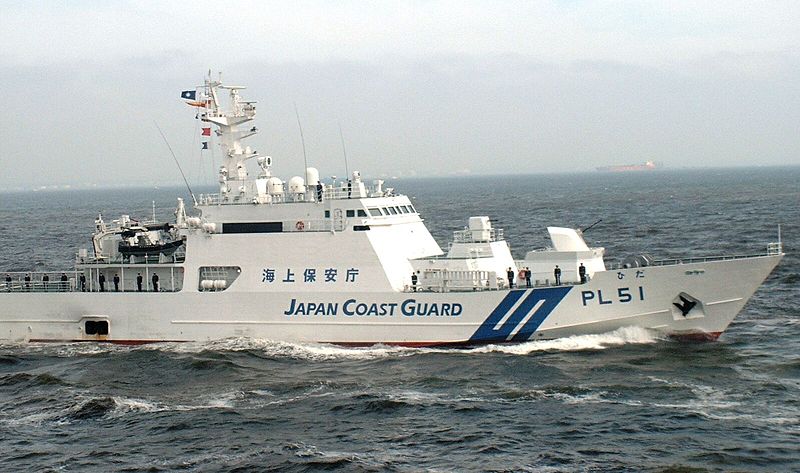HOW FAR WILL THE DRAGON SWIM? CHINA TURNS UP THE HEAT ON JAPAN
  |
| PRC SURVEILLANCE PLANE OVER JAPANESE WATERS PHOTO BY JAPANESE COAST GUARD |
OPINION:
We've been following the Senkaku/Diaoyu Tai dispute for months. Finally in the December 2012 issue of the Naval Institute's POCEEDINGS on page 10 David D. Chen and Cary C. Chen proposed something completely new, that could conceivably work. We covered their proposal in our posting of December 11, 2012. But at that time we noted that for it to work Taiwan would have to behave better since they were the first to actually invade Japan's territorial sea and engage an actual Japanese Coast Guard cutter with water cannon. We suggested that if the "Taiwan Solution" proposed by the Chens were to work there had to be a cooling off period.
China's naval intelligence establishment either didn't read the Naval Institute's PROCEDINGS this month or the civilian leadership chose to ignore the information. China is acting more like a thug state all of the time and in the days since the publication of the Institute's article have actually been increasing pressure on Japan.
 |
| Japanese Coast Guard Cutter , so far all sides in the dispute have deployed only coast guard type forces and avoided navy to navy confrontation. The most hazardous incident so far has been a Taiwan /Japan Coast Guard on Coast Guard water cannon fight inside Japan's recognized territorial waters. But as we describe in our text , the incident puts a dampener on the cure proposed in the Naval Institute Article. |
The aggressive game that China is playing is especially dangerous relative to the United States. The islands in question are specifically mentioned in the treaty between the United States and Japan as a portion of the Japanese homeland that the U.S is pledged to defend. The islands are uninhabited though surrounded by fairly rich fishing grounds. There is a possibility of off shore oil deposits. While all of the islands considered together are really only a few acres of sand, rock and scrub brush, they extend and enlarge Japan's ocean Exclusive Economic Zone. However China's aggressive naval actions challenging Japan's right to administer and economically exploit these islands is rapidly becoming so escalated that Japan has to seriously consider the cost benefit ratio of keeping these rocks. If they decide to keep them we have to help defend them. The cost benefit ratio to us is hardly worth it until you consider the symbolism. We must honor our defense treaty with Japan. We lose all credibility as an ally if we won't assist in repelling an aggressor invading an alley's real estate that we have recognized by treaty. All of our allies would have to question the value of any U.S. alliance. In the end if Japan decides to hang on to these islands we will have to back their claim with blood and steel. Even if Japan decides to give them up on her own, we have a problem. To give the islands up under military pressure from China is to reward aggressive behavior by a regional bully who has no compunction against aggressive behavior. The article by Chens presents a possible third way.
The Chens propose that Japan could transfer administrative control of the islands to Taiwan under Taiwan's title of "Republic of China". There is some valid historical reason for such a transfer and the rationale would be hard for Communist China to refute. In contrast to the treaty between the United States and Japan, the multi lateral 1943 Cairo Declaration of the Allies stated that Japan would be stripped of all the islands in the Pacific which she had seized or occupied since the beginning of the First World War in 1914. Japan would also be forced to return all territories stolen from China such as Manchuria, Formosa, and the Pescadores. The PRC has consistently maintained that the Cairo Declaration of 1943 which is incorporated by reference into the 1951 San Francisco Peace Treaty by way of the Potsdam Proclamation should be controlling despite the specific mention of the Senkaku / Diaoyu islands in the treaty.The PRC did not participate in the 1951 treaty because the Communist party was still engaged in running the Republic of China government off shore to Taiwan. The official name of Taiwan for quite some time was "The Republic of China". Indeed the government that the Cairo Declaration referred to was the very government that took refuge on Taiwan.
The Chens ask;"Why not hold the PRC to its word and turn the administration of the islands over to the Republic of China...?
One major problem that we created with that idea was our de-recognition of Taiwan as the "Republic of China" for the purpose which nation would occupy China's seat on the UN Security Counsel. Regardless of how the Taiwan card is played, no discussions can proceed in the face of continued aggression. This seemingly "tempest in a tea pot", that draws very little major media attention in the United States yet has the real potential to lead to war between China and the United States. In such a war, no matter how unsavory the outcome relative to the sea that China wants to turn into a Chinese Lake; the U.S. has great potential for gain, and China can only suffer ruin even with some initial highly destructive hits on the U.S.
War with China reverses our present economic position relative to China. We at present are the debtor nation. Certainly one of our first return shots if attacked would be cancellation of our debt, virtually bankrupting China. We doubt that it would have any negative effects on our global credit rating as no one expects a nation at war to subsidize the war efforts of their enemy. Many individual U.S.investors in China would lose their investments but many jobs might return to the United States as we would be forced to replace many products presently made in China with American capital and know how. If the conflict can be kept conventional, Chinese maritime commerce and infrastructure would be destroyed. Our own damages while extensive would be regional in nature. If China escalated to nuclear they might get in a couple of hits on Hawaii and the West Coast, we would lose millions of people and suffer trillions in damage. China however would be reduced to a glow in the dark parking lot. Why any nation led by sane people would play these games of brinkmanship is unfathomable unless you factor in the low level of journalistic interest in this deadly game due to its at sea location. This is a game played in near darkness. Since China controls its own media only wide spread coverage of the strange and irresponsible behavior by the media in the outside world can alert people and the rank and file communist party members of the danger the leadership is putting them in.
RELATED ARTICLES:
HOW VULNERABLE ARE U.S.BASES IN JAPAN:
http://globalpublicsquare.blogs.cnn.com/2012/12/07/u-s-bases-in-japan-sitting-ducks/

Amazon - Shop. Connect. Enjoy. All from Earth's Biggest Selection.
No comments:
Post a Comment